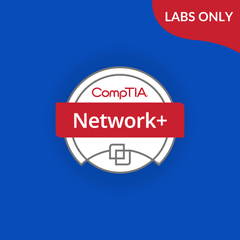Key Takeaways:
- CompTIA Network+ Overview: CompTIA Network+ focuses on essential networking concepts and technologies while maintaining a vendor-neutral approach. This certification is ideal for beginners or anyone building versatile, transferable networking skills.
- CCNA Overview: CCNA focuses strictly on networking and Cisco technologies. This certification fits learners who want to work with infrastructure and take on specialized technical roles.
- Prerequisites and Benefits of Each: Career goals and experience will shape the better choice. CompTIA Network+ supports entry-level learners and flexible growth. CCNA favors candidates with some technical background who want to focus on networking.
Every IT career starts with a decision, and for many, that decision comes down to two solid certifications: CompTIA Network+ or CCNA. The CompTIA Network+ vs. CCNA comparison offers valid routes to career growth, but the direction depends on your long-term goals. CompTIA Network+ builds broad, vendor-neutral skills across networking fundamentals, infrastructure, operations, and security. CCNA focuses on Cisco’s systems, preparing you for hands-on work with routers, switches, and layered infrastructure.
Career goals, experience level, and technical interests shape your choice, and that’s why Dion Training is here to help you make an informed decision. Our exam-aligned lessons, modular content, and student-centered approach are designed to support your certification journey. This post will walk you through each path, side by side. By the end, you won’t be guessing—you’ll have a clearer view of where you’re headed and how to begin.
CompTIA Network+ vs CCNA: Key Differences
Both CompTIA Network+ and CCNA certifications offer value, but each leads to a different kind of IT career. CompTIA Network+ builds a broad foundation across core networking disciplines. CCNA focuses on one: networking within the Cisco ecosystem. Knowing what sets them apart helps you make the call that fits your career plans.
Scope and Focus
CompTIA Network+ covers networking fundamentals, infrastructure, operations, and basic security. This wide scope creates flexibility. You can pursue entry-level roles, build a technical foundation, or branch into specialized areas over time. For example, CompTIA Network+ prepares newcomers for support, technician, or junior networking roles across various industries.
CCNA takes a more targeted approach by focusing entirely on networking, specifically Cisco systems. The training prepares you to configure routers, manage switches, and maintain secure, reliable networks. That structure makes CCNA a strong choice for someone who already knows networking is their path.
Vendor Neutrality
CompTIA Network+ offers a vendor-neutral approach, allowing professionals to apply their skills across various systems and technologies. This flexibility is beneficial in diverse IT environments where adaptability is key.
In contrast, CCNA’s Cisco-focused training means the skills acquired are best suited for Cisco environments. That specialization benefits candidates targeting roles that directly involve Cisco’s networking infrastructure.
Career Path and Job Roles
CompTIA Network+ can lead to entry-level IT positions such as help desk technician, IT support specialist, or junior network administrator. It’s ideal for individuals starting their IT careers or looking to establish broad networking knowledge.
On the other hand, CCNA aligns with more specialized roles like network engineer, network administrator, or systems engineer—particularly in companies using Cisco solutions. It’s best suited for those planning to build a career squarely in the networking domain.
Exam Structure and Difficulty
CompTIA Network+ is designed to assess a broad set of foundational networking skills. The exam structure is accessible for those at the beginning of their IT journey, making it suitable even without prior hands-on experience.
CCNA, by contrast, is more specialized and dives deeper into networking protocols, troubleshooting, and Cisco configurations. It has a steeper learning curve, especially for those without technical experience, but provides strong, focused coverage for a dedicated networking path.
Cost and Accessibility
Cost is a key factor in the decision-making process. The CCNA exam costs about $300—and that’s just the start. Most candidates also invest in practice materials, training courses, and lab environments, with total preparation costs often exceeding $1,000.
CompTIA Network+ is typically more budget-friendly. Dion Training’s CompTIA Network+ course bundles include practice exams, virtual labs, and step-by-step video content—all designed to boost your success. We also provide discounted exam vouchers to keep your total investment manageable. For students seeking quality, affordability, and a flexible start in IT, CompTIA Network+ offers a smart, well-rounded path.
Which Certification Suits Your IT Career Goals?
Choosing between CompTIA Network+ and CCNA comes down to where you see yourself in the tech world. Both certifications offer real career potential, but each aligns with different goals, interests, and levels of specialization. Consider the path that fits your direction best:
CompTIA Network+ May Be a Better Fit If You Want To:
- Build a broad foundation in IT networking across infrastructure, operations, and basic security.
- Pursue entry-level roles like IT support specialist, help desk technician, or junior network admin.
- Work in environments with mixed technologies that aren’t tied to a single vendor.
- Pivot between roles or specializations as your career evolves.
- Launch an IT career with flexibility before you narrow your focus.
-
Develop generalist networking skills that support consulting, tech support, or cross-functional teams.
CCNA May Be a Better Fit If You Want To:
- Specialize in networking with hands-on training focused on Cisco infrastructure.
- Pursue roles like network administrator, network engineer, or systems engineer.
- Work in enterprise or corporate environments where Cisco systems are the backbone.
- Manage and maintain large-scale networks with advanced configurations and security protocols.
- Advance quickly in networking-specific roles with a deep, technical skill set.
- Follow a clear certification ladder toward CCNP and other advanced Cisco credentials.
CompTIA Network+ vs CISCO Prerequisites
Before starting any certification path, it's important to understand what background knowledge is expected. CompTIA Network+ and CCNA differ significantly in how they approach entry requirements, and knowing what you're stepping into can help you plan your next move.
CompTIA Network+ Certification
CompTIA Network+ is designed for accessibility. It’s built for beginners, including those with little or no technical experience. While there are no formal prerequisites, candidates are expected to demonstrate basic knowledge of networking concepts, infrastructure, troubleshooting, and security—all of which are taught within the certification itself.
Although prior experience isn’t required, CompTIA recommends having either completed CompTIA A+ first or having roughly nine to twelve months of hands-on IT or networking experience. Completing A+ or gaining some foundational knowledge can help students feel more prepared for the Network+ exam. Because the learning path is flexible, CompTIA Network+ works well for individuals exploring IT for the first time or looking to reskill into technical networking roles.
CCNA Certification
The CCNA certification assumes a stronger technical foundation. While there are no enforced prerequisites, Cisco recommends at least one year of working with networking technologies before attempting the exam. That includes familiarity with IP addressing, routing and switching concepts, and network troubleshooting.
Many students prepare through Cisco Networking Academy courses or by gaining experience in help desk or junior networking roles. A formal background in networking isn’t mandatory, but those entering CCNA without prior exposure often spend more time studying or require supplemental labs and hands-on practice to get up to speed.
Benefits of Choosing CompTIA Network+ Certification
CompTIA Network+ offers a practical, flexible certification path for anyone starting or advancing a career in IT networking. Here’s why it remains a strong choice:
- Covers Essential Networking Topics: CompTIA Network+ builds a strong foundation in networking fundamentals, infrastructure, troubleshooting, and basic security, setting you on a path for additional CompTIA IT training. It’s a launching point for general networking roles or further specialization into fields like cybersecurity or cloud systems.
- Vendor-Neutral Curriculum: CompTIA Network+ teaches skills that apply across multiple platforms, including Cisco, Microsoft, and other multi-vendor environments. This adaptability makes professionals more valuable in diverse IT ecosystems.
- Progressive, Stackable Structure: CompTIA Network+ fits into CompTIA’s stackable certification model. Many students start with CompTIA A+, progress to Network+, and later specialize with certifications like Security+, following a clear, skill-building path.
- Widely Recognized in the Industry: CompTIA Network+ is respected by employers across both private companies and public organizations. It’s often listed as a preferred or required credential for networking and IT support roles.
- Affordable Training with Dion Training: We offer full CompTIA Network+ bundles for under $400. Packages include discounted exam vouchers, practice exams, on-demand video lessons, virtual labs, and support resources—everything you need for a first-attempt success.
Benefits of Choosing CCNA Certification
The CCNA certification is built for learners who want to specialize in networking and gain hands-on, Cisco-focused skills. Here's why it stands out:
- Focuses Deeply on Networking: CCNA training prepares students to configure routers, manage switches, troubleshoot network issues, and secure infrastructure—key tasks in network administration roles.
-
Teaches Practical, Job-Ready Skills: The certification emphasizes real-world scenarios and performance-based learning. Candidates gain technical confidence through labs, simulations, and protocol analysis.
Recognized by Employers Worldwide: CCNA is highly respected in corporate, enterprise, and government environments that rely on Cisco systems. Employers often list it as a baseline requirement for networking roles. - Opens the Door to Advanced Cisco Certifications: CCNA acts as a stepping stone to higher-level certifications like CCNP and CCIE. These credentials support long-term career growth in network design, architecture, and security.
- Supports Career Progression in Specialized Roles: Professionals with CCNA often pursue titles like network engineer, network administrator, and systems engineer, with increased earning potential and technical responsibility.
Final Thoughts
The choice between CCNA vs CompTIA Network+ depends on your goals. CompTIA Network+ offers versatility and a flexible starting point for networking careers. CCNA provides technical depth for those focused on Cisco-based networking roles. Still deciding between CCNA vs CompTIA Network+ for your career? Explore Dion Training’s CompTIA Network+ learning path and choose a certification that fits your direction.
Read more:
- What Is CompTIA Network+? Certification Overview and Benefits
- Navigating the CompTIA Network+ Certification: N10-008 vs N10-009
- What Even Is ITIL 4 and Why Does Everyone in Tech Talk About It?
Frequently Asked Questions About CompTIA Network+ vs CCNA Certifications
How long does it take to get CCNA certified?
Most students earn their CCNA in 3 to 6 months, depending on their experience and study schedule.
What is the cost of the CompTIA Network+ certification?
The CompTIA Network+ exam fee typically falls between $348 and $370. Dion Training offers competitively priced course bundles that include exam vouchers, practice exams, and guided video lessons to make certification more affordable.
What level of experience is needed for CompTIA Network+?
CompTIA Network+ is designed to be accessible to beginners. While there are no formal prerequisites, having foundational knowledge, such as completing CompTIA A+ or gaining 9 to 12 months of IT support experience, can make preparation smoother. Dion Training’s Network+ course is built to help both new and advanced learners succeed.
What level of experience is needed for a CCNA certification?
The CCNA certification generally requires a solid understanding of networking concepts, which might take about 1–3 years of hands-on IT or networking experience to build. It’s best suited for those already committed to a networking-focused career path.
Which certification is better for network security roles?
CCNA offers a deep focus on network infrastructure, which is highly valuable for security roles involving routers, switches, and layered defenses. CompTIA Security+ provides broader cybersecurity coverage, including risk management and threat analysis. Combining CCNA with Security+ builds a strong, well-rounded security skill set.
Which certification has a broader scope for IT careers?
CompTIA certifications, including Network+, offer a broader scope for IT careers. They cover networking, cybersecurity, cloud fundamentals, and more, providing flexibility across different career paths. CCNA is more specialized, focusing deeply on networking and Cisco technologies. Dion Training’s career-oriented approach helps you choose and navigate the best certification path for long-term success.
Which certification should I choose if I am a complete beginner in IT?
If you’re a complete beginner in IT, starting with CompTIA A+ is recommended to build a foundation. From there, progressing to CompTIA Network+ helps you develop essential networking skills. Dion Training’s practical, beginner-friendly courses ensure you build confidence while preparing for your certification and beyond.







